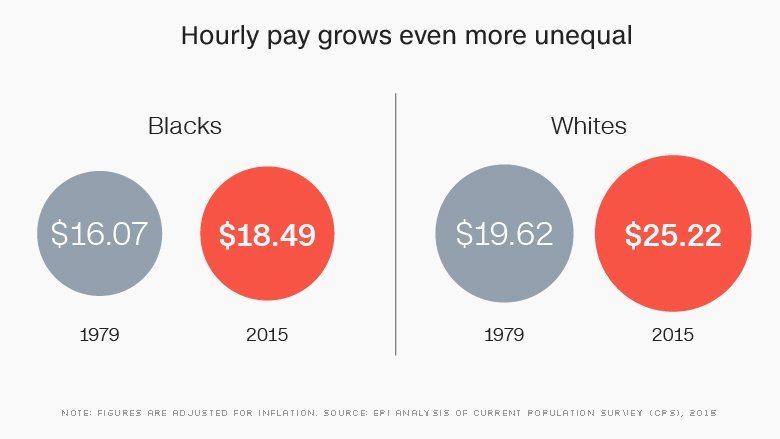-
Tips for becoming a good boxer - November 6, 2020
-
7 expert tips for making your hens night a memorable one - November 6, 2020
-
5 reasons to host your Christmas party on a cruise boat - November 6, 2020
-
What to do when you’re charged with a crime - November 6, 2020
-
Should you get one or multiple dogs? Here’s all you need to know - November 3, 2020
-
A Guide: How to Build Your Very Own Magic Mirror - February 14, 2019
-
Our Top Inspirational Baseball Stars - November 24, 2018
-
Five Tech Tools That Will Help You Turn Your Blog into a Business - November 24, 2018
-
How to Indulge on Vacation without Expanding Your Waist - November 9, 2018
-
5 Strategies for Businesses to Appeal to Today’s Increasingly Mobile-Crazed Customers - November 9, 2018
Report finds racial wage gap widest in nearly 4 decades
A new report from the Economic Policy Institute reveals a stark disparity between the hourly pay of blacks and whites; on average, whites make 26.7 percent more than blacks, earning $25.22 an hour compared with $18.49 for blacks.
Advertisement
This newly published data on the wage gap doesn’t even include the most damning numbers around: A Pew Research Center report found that in 2015, on average, a black man earned around $15 an hour, while a white man earned $21 – aka 71 cents on the dollar.
The study said black women were almost on par with white women in wages in 1979. The widening gap has not affected everyone equally.
In recent years, younger black women ― those ages 18 to 35 with 10 years’ experience or less in the workplace ― have lost the most ground relative to their white counterparts.
EPI chose 1979 as its starting point because that’s when wages across the country stopped growing in tandem with productivity.
“People should be troubled and really question why we would observe this pattern through 2015”, Valerie Wilson, director of EPI’s Program on Race, Ethnicity and the Economy, told the Huffington Post. It can also affect the way people see the American Dream.
The wage gap is still alive and well: not only between male and female employees, but also between black and white workers. Sustained decreases in the adjusted wage gap have not occurred since 2000.
Wage-growth inequality is also stark among the top 5 percent of income recipients and everyone else, the report says.
Meanwhile, wages for black men and women have grown more slowly than for whites resulting in the wage gap remaining unchanged or expanding in the decades that followed.
Younger black women, or those with 10 years of experience or less, have lost the most ground compared to their white peers since 2000.
In comparing women, EPI found that black women earned almost 12 percent less than white women past year.
The Economic Policy Institute report found the wage gap persisted even when controlling for differences between black and white workers in educational attainment, experience or geographic locale. In 1979, when landmark civil rights laws were newer, blacks earned 16.9 percent less. While they made 34% less than white men in 2015, in 1979 they made 42.3% less than white men back.
In the 1980s, there was a massive decline in the number of higher-paying unionized jobs, which hit African-Americans disproportionately hard, especially in the Midwest, according to EPI.
Advertisement
Race/ethnicity categories are mutually exclusive (i.e., white non-Hispanic, black non-Hispanic, and Hispanic any race).





























